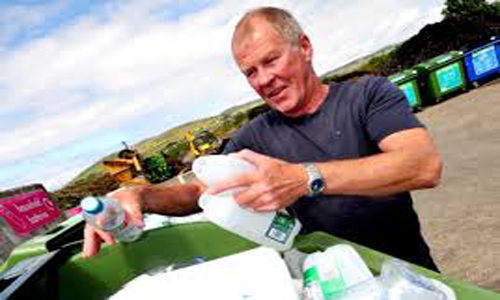 Recycling black plastics and other complex polymers may soon be feasible due to breakthrough trials which have identified for the first time
Recycling black plastics and other complex polymers may soon be feasible due to breakthrough trials which have identified for the first time
reprocessing methods capable of separating them out.
Over a million tonnes of plastics packaging still ends up going to landfill because of the difficulty of collecting and recycling films, challenges in detecting and sorting black plastics and the lack of high value markets for non-bottle plastics.
However a series of trials, funded by WRAP, have now identified methods of recycling black plastics, complex laminated plastics, plastic films, and polypropylene.
For example, by using non-carbon pigments in the manufacture of black plastics, it is possible to create a material that is almost identical in colour, but can be identified by the optical sorting equipment used by many materials recycling facilities (MRFs).
This could lead to the widespread recycling of the most common plastic used in packaging. Feedback from retailers has been encouraging, and the plastic trays could be recycled into high value single-polymer materials.
Complex laminated packaging, the material used in toothpaste and cosmetics tubes, contains a layer of aluminium sandwiched between plastic, and a second trial has identified a way to extract this high value aluminium.
WRAP estimates that there is around 140,000 tonnes of this laminated packaging in the UK waste stream with an aluminium content of around 13,500 tonnes. A third study has seen the development of a technique that could recycle post-consumer polypropylene back in to material suitable for food-grade applications.
More work is still needed, but WRAP believes this could help to grow high value markets for recycled polypropylene, following a similar path to that developed by rHDPE and rPET. It could also deliver higher environmental benefits as retailers and brands start to use it in their packaging.
And work done by The Co-operative Group and Sainsbury’s, with WRAP, has identified a variety of uses for plastic films recycled in-store by customers and staff. These applications include bags for life, in-store signage and external cladding.
A system has also been developed that cleans and recycles contaminated film, producing a pellet with a sales value of £400 to £500 per tonne. With the cost of sending this material to landfill currently £80 per tonne, the advantages are clear.
WRAP’s director of closed loop economy, Marcus Gover, said: “When we first looked at recycling non-bottle plastic packaging back in 2007, we carried out detailed studies to make sure it would be technically and economical viable.
“We also carried out a thorough life-cycle assessment to make sure it was the best environmental option. We’re now seeing this recycling becoming a reality, creating jobs and re-invigorating the manufacturing industry in the UK reducing our reliance on exports.”
Source : www.edie.net





